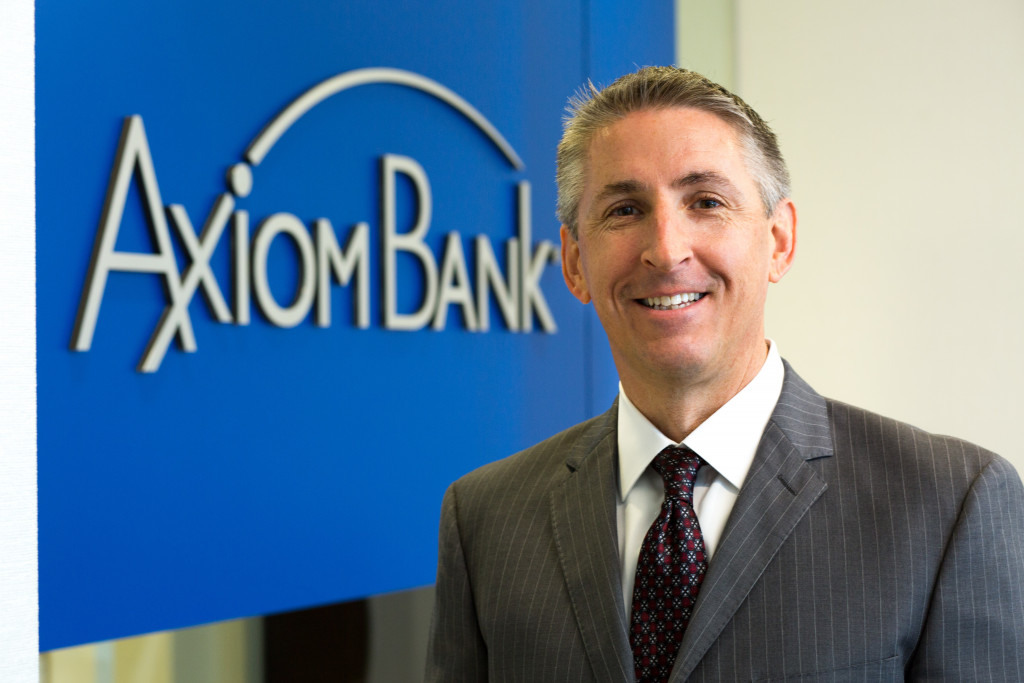Axiom Bank Acquires Allied Affiliated Funding
July 12, 2018
Axiom Bank, a community bank with retail branches located inside Walmarts throughout Florida, announced this week that it has acquired a factoring company, Allied Affiliated Funding.
“Allied has a proven track record of success with accounts receivable lending, which fits well with Axiom’s broader business plan to diversify and expand our commercial lending operation,” said Axiom Bank President and CEO Daniel Davis. “Allied is also an excellent fit culturally for us. They have a strong management team with the expertise to help emerging companies and businesses that are seeking growth, as well as those that need working capital.”
Allied’s factoring product will add to Axiom Bank’s offering for its small business owners clients. Likewise, Axiom Bank’s capabilities in cash management services will provide new opportunities for Allied’s current commercial clients. Allied is based in Dallas, Texas.
“Axiom is a Florida-based nationally chartered bank with a strong entrepreneurial spirit that is focused on maximizing clients’ potential,” Allied Affiliated Funding CEO Clay Tramel. “Combining forces helps us to deliver on a shared vision with greater creativity by offering new exciting products, including asset-based lending, in the marketplace.”
Tramel will stay on as CEO of what will now be known as Axiom Factoring. Gen Merritt-Parikh will serve as President and be in charge of the day-to-day operations.
Acquiring other companies has been a cornerstone of Axiom Bank’s growth strategy, including branch expansions (there are now 24 branches) as well as the launch of AxiomGO, a mobile banking app. Axiom was also recently approved as an SBA preferred lender, a designation that allows the bank to independently approve and underwrite SBA 7(a) loans.
Established in 1962, Axiom Bank is based in central Florida and provides retail banking services, including checking, deposit, and money market accounts.
iAdvance Now Hires Chief Revenue Officer
July 11, 2018
iAdvance Now announced on Tuesday that it hired John Kuriger as Chief Revenue Officer, who was formerly Vice President at Lendio.
“We believe that John is the missing piece of the puzzle for us to take iAdvance Now to the next level,” said iAdvance Now cofounders Belal Ayoub and Eddie Hamid in a joint statement. “John will bring with him positive changes that will result in benefits for our merchants, our employees, and our strategic partners. We’re looking forward to the future and fulfilling the vision we have for iAdvance Now and couldn’t have picked a better individual to join us on this journey.”
Ayoub told deBanked that hiring Kuriger is part of a larger effort to grow the company’s business. Currently, 90 percent of iAdvance Now’s business comes from its merchant cash advance product. The company, a large ISO with 65 employees, also offers term loans, SBA loans and factoring. But Ayoub said that part of Kuriger’s job will be to develop more business for these other product offerings, and also to help with project management to improve efficiency and overall conversion.
iAdvance Now provides financing to customers in a variety of industries, including medical offices, restaurants, trucking, and beauty salons. Ayoub said that no single industry is dominant in his business and that 100 percent of his business is generated internally. Of the company’s 65 employees, 45 of them are salespeople.
iAdvance Now has a third cofounder, Troy Caruso, who is also the company’s CFO. The company was founded at the end of 2014 and is based in Long Island. Ayoub also said that the company expects to grow this year into next and may move into a larger office.
Lendistry Becomes a Member of the Federal Home Loan Bank of San Francisco
July 11, 2018
Lendistry announced yesterday that it has been approved for membership by the Federal Home Loan Bank of San Francisco. This will allow the lender to expand its commercial real estate loan business, which Lendistry launched in January.
“It’s an honor to be a member of the Federal Home Loan Bank of San Francisco, an organization committed to community development by expanding availability of credit,” said Lendistry CEO Everett K. Sands. “We look forward to leveraging our unique business model of being a hybrid of a community bank and a fintech company to expand access to capital to all.”
Lendistry offers SBA loans (up to $250,000), traditional small business, or term, loans (up to $1 million), bridge and short-term loans (up to $500,000), and most recently, commercial real estate loans (up to $2 million). Sands told deBanked that about 65 percent of its business is derived from SBA loans, about 30 percent comes from term loans, and the remainder is a mix from the other loan types. Of the term loans, Sands said that the average is a four year loan with a 12 percent interest rate.
About 70 percent of Lendistry’s business comes from a combination of bank referrals and commercial loan brokers, or ISOs. Otherwise, Lendistry obtains customers from affiliate partners, like Lending Tree, and from its own direct efforts. Out of a 22 person team, Lendistry employs eight salespeople. And Sands said that about 70 percent of the team has a banking background.
Lendistry customers come from a variety of industries including healthcare, restaurants and home improvement. Sands said that the bulk of its business comes from merchants in the medical and manufacturing industries because these are the types of companies that their bank partners have been sending them lately. The lender also makes a fair amount of loans to restaurants, Sands said.
Lendistry has a partnership with The Center, a nonprofit that provides small business owners with educational resources, such as workshops, training videos, coaching sessions, and networking opportunities. Founded in 2015, Lendistry is based in Brea, California, outside of Los Angeles.
Australian Lenders Commit to Best Practices Code
July 10, 2018 Six small business fintech lenders operating in Australia, including OnDeck, have signed a self-imposed “code of best practice lending principles,” according to a recent statement from Prospa, one of Australia’s largest online small business lenders. This comes shortly after Prospa paused its June IPO, having received a letter from the Australian Securities and Investments Commission (ASIC) requesting information.
Six small business fintech lenders operating in Australia, including OnDeck, have signed a self-imposed “code of best practice lending principles,” according to a recent statement from Prospa, one of Australia’s largest online small business lenders. This comes shortly after Prospa paused its June IPO, having received a letter from the Australian Securities and Investments Commission (ASIC) requesting information.
Possibly in response to ASIC’s inquiries into the Prospa IPO, what has emerged is a code of best practices signed by Prospa, OnDeck, Capify, GetCapital, Moula and Spotcap. This set of self-imposed rules, referred to as the Code, has not yet been solidified, but it already includes a number of constituents in a highly collaborative effort.
The six small business signatories will be contributing to the Code, along with a trade group for the Australian finance sector, the Australian Finance Industry Association (AFIA), the Australian Small Business and Family Enterprise Ombudsman, Kate Camel, the Bank Doctor, an SME advocate, and FinTech Australia, an industry association. According to the Prospa, the Code will be fully operational and enforceable by December 31, 2018.
“Our Online Small Business Lender Group members have embraced the sentiment of improving transparency and disclosure and took proactive action to come together quickly and collegiately to develop a Code,” said Helen Gordon, CEO of AFIA.
Acknowledging that small business lenders are already subject to rules from a number of regulatory bodies, the Prospa document stated:
“This Code is a proactive move to pull the obligations of online small business lenders together into one document. This makes it easier for current market participants and will also help new entrants understand their obligations.”
Already, some of the central elements agreed upon in the Code include:
- The introduction of a pricing comparison tool providing key metrics that will allow customers to compare the cost of unsecured loans from the signatories (including the total repayment amount, APR, simple annual interest rate)
- An easy-to-understand loan summary
- A glossary of key terms in accessible language that applies directly to online small business loans
- Signatories must attest their compliance with the Code on an annual basis
According to the Prospa statement, the Code was modelled after best practice examples and feedback from the US and UK, where the online lending industry is more developed.
This list of tenets already seems quite progressive, or onerous, depending on who you ask. The notion of introducing or requiring a price comparison tool is a hot button topic here in the US. Requiring that loans and merchant cash advance products be labeled with an APR or an Annual Cost of Capital (ACC) is what the state of California is moving towards with a highly contested bill that passed in the state assembly committee in June.
Proponents of the bill SB 1235, introduced by California State Sen. Steven Glazer, want to make certain that all small businesses can easily understand and compare the cost of loan and finance products. Opponents of the bill, many in the merchant cash advance industry, insist that a requirement like this amounts to shutting down their industry because a precise APR or ACC cannot be applied to a cash advance product given that the product depends on the duration of the deal, which is variable.
While not as formal, some efforts in the U.S. are also being made by alternative finance industry players to self-regulate. In May, the Small Business Finance Association (SFBA) announced the launch of an initiative called the SFBA Broker Council, which has a mission to create standards and best practices for brokers.
Thinking Capital, Equifax Create Canadian Small Business Credit Grades
July 10, 2018
Equifax and Thinking Capital today announced the launch of BillMarket, a service that will now provide Canadian small businesses with a credit grade, A through E. CEO and cofounder of Thinking Capital Jeff Mitelman told deBanked this is revolutionary because, up until now, a Canadian small business’ creditworthiness has usually been based on the personal credit score of the small business owner.
“BillMarket creates a new language of credit for small business in Canada,” Mitelman said. “For the first time, there is a practical way to talk about and put a dollar value on small business credit in Canada. BillMarket expands the purchasing power for Canadian SMBs and eliminates friction in the supply chain.”
Equifax offers this new credit grade for free, and simultaneously, a small business owner is offered a supply chain financing deal by Thinking Capital. Specifically, if a small business owes money to a vendor in 30 days, Thinking Capital can turn that 30 day invoice into a 120 day invoice. Thinking Capital pays the small business’ vendor and the small business has 120 days to pay Thinking Capital. There are fees associated with this, which are based on the small business’ credit grade, but a small business can simply use Equifax’s credit grade and seek funding elsewhere.
“BillMarket represents a cash flow revolution for the Canadian small business market,” he said.
Traditionally, Thinking Capital provides an MCA product, which it calls Flexible, as well as a term product, which it calls Fixed. The company provides funding up to $300,000 to small to medium sized Canadian businesses. Clients must be in business for at least six months and have average monthly sales of at least $7,000. The funder was acquired in March by Toronto-based Purpose Financial, but it still uses the Thinking Capital name.
Founded in 2006, Thinking Capital employees roughly 200 people and has offices in Montreal and Toronto.
The Past, Present and Future of the ILC Bank
July 9, 2018 Last Thursday, Square confirmed that it withdrew its application to the FDIC for depository insurance, which would allow it to take deposits from customers in all 50 states. The company said it plans to refile.
Last Thursday, Square confirmed that it withdrew its application to the FDIC for depository insurance, which would allow it to take deposits from customers in all 50 states. The company said it plans to refile.
This is not the first time that a fintech company has withdrawn a bank application from the FDIC. Last October, SoFi withdrew its application in the wake of sexual harassment allegations against its then CEO Mike Cagney. SoFi has not explicitly stated that it plans to refile.
Regardless of the reason for withdrawing the application, this news revives the debate over whether fintech companies should be allowed to become banks in the first place – at least in the manner that Square and SoFi have sought to attain bank status. Both companies have submitted applications to the Utah Department of Financial Institutions to become Industrial Loan Company (ILC) banks.
This is controversial because ILC banks are not subject to the same regulations that other banks are. For instance, an ILC bank can engage in commercial activity outside of banking which could jeopardize the bank, critics contend. Under the 2010 Dodd-Frank Act, which came in response to the Great Recession, there was a moratorium on establishing ILC banks because they were deemed to be a risk to the U.S. banking system. The moratorium was lifted in 2013.
Chris Cole, Senior Regulatory Counsel at Independent Community Bankers of America (ICBA), a trade group, is a big opponent of ILC banks. He maintains that companies seeking to become ILC banks are simply taking advantage of an old policy that is no longer relevant. He explained that ILCs were created as banks for industrial workers in the early 1900s.

“They were meant to serve a certain type of industrial worker that had trouble finding a commercial bank they could bank with,” Cole said. “Now we don’t have that problem anymore. Industrial [or other lower paid] workers have plenty of opportunities to bank. This charter is completely outdated [and is] a loophole that should be closed so that the owners of these bank-like institutions are restricted in the same way that commercial banks are restricted.”
Last year, deBanked spoke to Richard Hunt, president and CEO of the Consumer Bankers Association, who echoed Cole with the regard to the initial purpose of ILC banks.
“No one envisioned when they wrote the ILC charter that we would have fintech companies that finance mortgages and student loans from private equity capital and not deposits. It’s a new world. Like with all rules and regulations, federal regulators should periodically review longstanding policy,” Hunt said.

Cole said that in addition to Square and SoFi, another fintech company recently applied to become an ILC bank. That company is NelNet, which services students loans, and it submitted an application to the FDIC less than two weeks ago.
So far, the FDIC has not approved of any ILC banks since Dodd-Frank. (There are only about 30 of them right now.) But that may soon change under the leadership of the agency’s new Chairman, Jelena McWilliams.
“I am hopeful that Jelena McWilliams will follow the same course as her predecessors have [and not issue ILC charters],” Cole said. “Issuing a moratorium is what I’d like to see.”
But McWilliams, who assumed the new role on June 5, may be more open to approving these applications than her predecessors. She said during a recent conference:
“The agency has a duty to the public to actually proceed [with the applications.] Now, that doesn’t mean that we will approve every application. That doesn’t mean that we will deny every application.”
What Will Happen to HomeZen After the Breakout Capital Deal?
July 3, 2018 With today’s announcement of Breakout Capital Finance’s acquisition of HomeZen’s technology, deBanked wondered what will happen to HomeZen after the acquisition of its technology.
With today’s announcement of Breakout Capital Finance’s acquisition of HomeZen’s technology, deBanked wondered what will happen to HomeZen after the acquisition of its technology.
HomeZen’s co-founder and Head of Technology Mike Spainhower will work with Breakout Capital to help integrate the HomeZen technology into Breakout Capital’s system, Breakout Capital Chief Operating Officer Mendelsohn told deBanked. But Spainhower will not be joining Breakout Capital as an employee, nor will any other former HomeZen employees. HomeZen will still service its existing clients, but will no longer seek additional clients or operate under the HomeZen name. HomeZen, which provided software tools for home sellers to more efficiently sell their homes, was founded in 2016 in the Washington D.C. area.
Mendelsohn said that prior to this acquisition, BreakOut Capital founder and CEO Carl Fairbank and HomeZen co-founder and CEO Kevin Bennett knew each other as part of the Washington D.C.-area tech community.
The HomeZen website is currently down, which is not an error. Mendelsohn said that the transaction between the two companies meant that HomeZen would cease offering its technology, and website, to new customers.
While Mendelsohn acknowledged the real estate technology company Zillow as a potential competitor of HomeZen, he said that HomeZen’s offering was quite uncommon.
“They were pretty unique in offering sellers a suite of [real estate] tools to do it themselves really be empowered to direct the sales process yourself.”
Breakout Capital has grown its loan originations throughout the year and also obtained a $15 million facility at the end of May that has allowed it to build out a factoring product, called FactorAdvantage.
Of the acquisition, Mendelsohn said:
“You have to take the long view with this and say ‘They’re serving real estate sellers, we’re serving small business owners.’ This may seem a little discontinuous, but what they’re doing is the same thing we’re doing. They’re providing great tools, calculators and other ways to evaluate offers. And that’s exactly what we do. This will allow us to give our applicants and borrowers access to that high quality experience.”
Founded in 2015 by CEO Carl Fairbank, Breakout Capital is based in McLean, Virginia.
Former Mazuma Capital Board Member Considered as Supreme Court Justice
July 2, 2018 Senator Mike Lee of Utah, who had been on the board of directors of Mazuma Capital, is now being considered by President Trump to replace Justice Kennedy on the Supreme Court.
Senator Mike Lee of Utah, who had been on the board of directors of Mazuma Capital, is now being considered by President Trump to replace Justice Kennedy on the Supreme Court.
Mazuma Capital is an equipment leasing company that finances businesses in the energy, construction, healthcare and fitness industries, among others. In its more than 12 years in operation, it has funded transactions from $250,000 to $50 million.
Mazuma was acquired by Onset Financial in 2014 and is based in the Salt Lake City area.






























